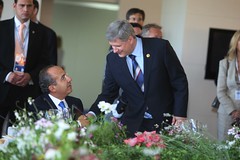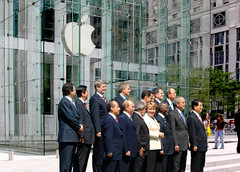As if putting eight high ranking politicians into one room isn’t enough, let us not forget about the G-20, which is a grouping of the world’s twenty economic powerhouses’ financial ministers and central bank governors.
Lots of “G’s” but do these organizations, representing the richest, most prosperous, and most powerful countries on the planet, actually make a difference?
Canada’s Prime Minister, Stephen Harper has shown publicly just how important these summits are – he almost missed the group photo opportun
 Image by Gobierno Federal via Flickr
Image by Gobierno Federal via Flickr
Today, Prime Minister Harper indicated how old-school and irrelevant the G8 may have become.
“Some people say that the G8 is not a representative body in the modern world,” he said during the closing remarks of this year’s summit. “It is not representative of the power, it is not representative of the economic realities of the modern world, it’s not an appropriate forum for global governance. I agree with that, I don’t think those of us who continue to support the importance of the G8 suggest that it is a body of global governance.”
So why bother wasting jet fuel for these meetings?
Prime Minister Harper hinted that the G8 may soon be the G9, G10, or maybe even the G20 (minus the hyphen of the financial G-20), as other countries – including ones in the developing world -- have been invited to participate in the next G8 summit, which will be held next year in Muskoka, Ontario, Canada.
Inclusiveness is always better than exclusiveness, but the more people sitting around the conference table, the harder it will be to pass motions, make policies and effect change upon the world.
 Image by gabemac via Flickr
Image by gabemac via Flickr
That’s always been the problem with the United Nations (UN). Although the UN means well, with 192 member countries, each with their own delegation of representatives, each with its own country’s best interests at the top of the agenda, UN meetings turn into endless debates, which often pass motions so watered down to please as many member states as possible, that it renders their policies ineffective.
Though one can even question the value of just having eight world leaders locked in room talking shop.
Thanks to technological improvements, and changes in the global economy, we have lived in a constantly shrinking global village. But even the most open-minded world leader will always put his or her own country’s interests ahead of the group – what matters to most politicians is pleasing those who have the power to vote them in – or out – of office.
During this past week’s G8 Summit, debate raged on over climate change, democracy in Iran, and the economy, but did anything really get done?
Will the world suddenly be a better place, thanks to this week’s series of meetings, debates, and discussions?
Originally created in 1974 to tackle the on-going oil crisis which begun a year earlier, the G8 even defines itself as an informal forum, so it doesn’t have the same structure as the UN. There isn’t a permanent secretariat, official offices, or even a president. The president of the group rotates through the member countries, starting with each New Year on January 1.
Perhaps the G8 is too informal – over the years, they have created policies to reduce global poverty, find a cure for AIDS, limit the amounts of carbon produced by member nations to eliminate acid rain, and most recently work towards better environmental practices to limit climate change.
However, criticism of the G8 has found that there action – or in some cases lack of action – have contributed to extreme poverty in Africa and many third-world countries, increases in global warming due to carbon dioxide emission rates, and limiting research and medicines for AIDS patients due to strict policies on medicine patents.
In the end, the G8 really is nothing more than a meeting of the minds. But those minds can impact our world in far reaching ways.
![Reblog this post [with Zemanta]](http://img.zemanta.com/reblog_b.png?x-id=d2e4b84f-d4fe-4585-a2e8-106d1e5c5d3d)








No comments:
Post a Comment